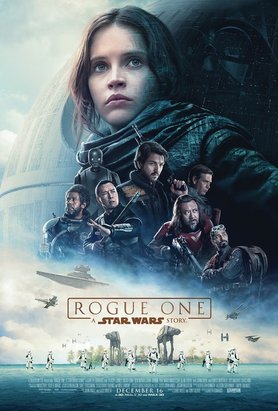 I have been shying away from writing a review of Rogue One, because it seems to me to be impossible to do so without spoiling it. So instead, I’m going to write a review of the reviews of Rogue One; specifically, I’m going to take issue with the use of the phrase “It’s for the fans.” Whether the writer of the review is a fan or a critic of fans, the use of this term strikes me as sloppy. If the writer is a fan, it is a dismissal of criticism; it gives the fan permission to ignore the potential flaws of the work in question. If the writer is a critic, the phrase “it’s for the fans” is a dismissal of value; it gives the critic permission to ignore the achievements of the work in question, on the basis that they are an outsider, who doesn’t get it. I can understand the use of this term in reference to The Force Awakens. Much as I enjoyed it, the main gambit of The Force Awakens was nostalgia; it relied heavily on the fact that its viewers had seen, and adored, the previous three movies in the series, and were anxious to see more of them. In fairness to The Force Awakens, it delivered; Star Wars fans can be notoriously difficult to please, and apparently what they (and we) wanted was in fact a movie almost exactly like the originals, but with a promise for more. This isn’t true of Rogue One. I can only speak from the perspective of a long-time fan, but it seems to me that it would be equally valid to see Rogue One before seeing A New Hope, as the other way around. A central reason for this is the fact that the characters of Rogue One are as unfamiliar to fans as they are to viewers new to the franchise; Jyn Erso and Cassian Andor are not household names, as Skywalker and Organa and Solo are. In the course of a couple of hours, the protagonists of Rogue One need to earn the sympathy of the viewer from scratch. Calling Rogue One “for the fans” ignores the fact that they do earn it. It ignores the shared despair and hope and triumph and tragedy. It ignores that this movie goes beyond simple themes of good, evil, and redemption, and taps into more complex themes of what we are willing to do for liberty, and what we give up in order to get it. It ignores the fact that the Star Wars universe is vast and varied, and can provide more than just fairy tales with princesses and knights; it can also provide stories with grit, dark humour, and political awareness. For the Star Wars universe to grow, the old guard of Solos and Skywalkers is not enough. It has had to create new characters, and it has had to make its viewers care, and care deeply, in a short space of time. Despite its nostalgia, The Force Awakens had to accomplish this as much as Rogue One did. Rey and Poe and Finn needed to be worth cheering for, just as Jyn and Cassian needed to be. It wasn’t enough for it to be “for the fans.” It also had to be good. If you have not already, go see Rogue One. Not because it’s for the fans, but because it’s how fans are born.
1 Comment
|
Author
Jane Perrella. Teacher, writer. Expert knitter. Enthusiast of medieval swordplay, tea, Shakespeare, and Batman. Archives
June 2019
Categories |
 RSS Feed
RSS Feed
